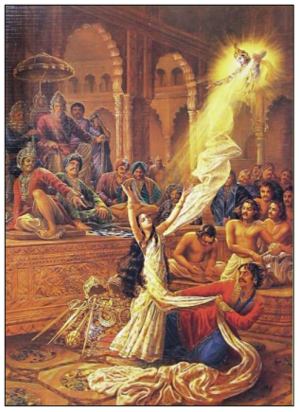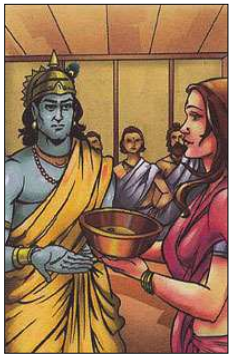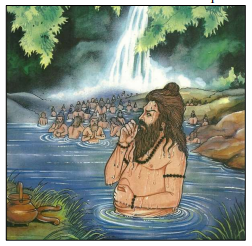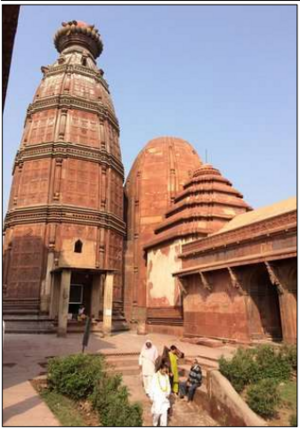Talk:Ārtta Worshipper:Praying in Distress
By Vishal Agarwal
This type of worshipper seeks the Bhagavān when he is in pain, ill, poor, in danger, or suffering from something else. His Bhakti is of the Rājasic type. The sacred literature contains numerous prayers of this type:
"I am the man who sang your glory at the time of the Soma Yajnas. Yet, torturing worries overpower me like a wolf assailing a thirsty deer. Give attention to this, O heaven and earth, like rival wives on both sides, my ribs are oppressing me. O Indra, biting cares are devouring me, your devotee, just like rats devour the weaver’s threads. Rigveda 1.105.7-8"
"All my strength is shattered, and I am bound in fetters. No solution makes any dent in my troubles. Says Nanak – Now I shall seek refuge only in Hari, for He alone is my support just as He alone saved Gajendra. Guru Tegh Bahadur in Guru Granth Sahib"
Some everyday examples of this type of worship are-
- “I have blood cancer. Please save me!”
- “I have not studied. Please make me pass the test.”
- “Save me from these terrorists.”
Pilgrim centers and major Mandirs have records of numerous Bhaktas whose prayers for wealth, a child, health, etc., were answered by Bhagavān. The Gita itself was revealed to Arjuna when he was in a deep state of despondency and mental confusion. He appealed to Krishna
"My very being is stricken with the taint of pity. With my mind confused as to what is Dharm, I ask you - Tell me, what is better for me for sure? Teach me, I am your pupil who has sought refuge in You. Gita 2.7"
Krishna treats Nārāyaṇa Bhattāripāda of Paralysis[edit]
In the sixteenth century, there lived in Kerala a great devotee of Vishnu named Narayana Bhattāthiripāda. He got stuck with paralysis and decided to worship Krishna at the Guruvayoor Mandir for a cure. Every day, he composed 10 verses in His praise, which he recited with great bhakti. In the first few days, he composed a little more than 10 verses. On the 100th day, he was miraculously cured. Most groups of 10 verses end with a verse asking the Bhagavān to heal him.
This collection of 1036 verses is called Narayaneeyam and is considered one of the greatest Sanskrit works of Bhakti. Even today, devotees in Kerala recite the entire work on special occasions like the Janmashtami. The Narayaneeyam is the epitome of the Shrimad Bhagavata Purana and describes the glory of the various Avataras of Vishnu.
Examples of Ārtta devotees in the Śāstra are Draupadi and Gajendra.
Krishna saves the honor of Draupadī:[edit]
Duryodhana never liked the fact that the kingdom of Indraprastha was doing so well, even though he had given the worst land to the Pāṇdavas. So, he decided to steal their kingdom by trickery. He invited the Pāṇdava brothers to a game of dice (gambling). He knew that Yudhishthira was addicted to gambling and would not refuse. During the game, Duryodhana cheated and the Pāṇdavas kept losing everything. But Yudhishthira was so addicted to gambling that after losing his kingdom, he even started staking his brothers, and finally his wife Draupadi. And due to Duryodhana’s cheating, he lost Draupadi too. Now Draupadi was supposed to be handed over to the Kauravas. The evil-minded Duryodhana asked his brother Dushasana to drag Draupadi to the royal court in front of dozens of elders, courtiers, royalty, and others. Draupadi cried and appealed for mercy but Dushasana did not listen to her. And then Duryodhana asked Dushasana to disrobe Draupadi in front of everyone, in full public eye. All the elders and everyone there were horrified. Bheema wanted to get up and beat the Kauravas there and then, but he controlled his anger. Draupadi appealed to the grandfathers, and elders to come to her rescue, but everyone was terrified of Duryodhana. No one came to her rescue against the bully Duryodhana.
At last, Draupadi remembered that Krishna had promised her eternal friendship. So, she surrendered completely to Bhagavān Krishna in her mind and appealed to His friendship. She thought of Him in her mind with faith and devotion and asked him to protect her from public humiliation. And a miracle occurred. As Dushasana started pulling her clothes, he found that he was not able to disrobe her. Her garments got stretched endlessly. He tried to disrobe her for a long time, but the cloth kept appearing miraculously and her Sari got extended till the pile of the unwound clothing taken off her became a small mound! Dushasana was tired but he failed to disrobe Draupadi.
Everyone understood that it was the Divine intervention of Krishna. The elders felt ashamed now that they had not intervened to save her honor. They asked Duryodhana to see the Divine miracle, repent, and return everything that the Pāṇdavas had lost back to them. Duryodhana relented but he invited the Pāṇdavas to a second game of dice. The Pāṇdavas lost their kingdom once again. According to the bet this time, the Pāṇdavas had to give up their kingdom for 13 years and go away from Hastināpur.
Krishna eats a Grain of Rice[edit]
There was a time when the five Pandava Princes, Princess Draupadi, and Queen Kunti were forced to leave their palace and live in the forest. It was very tough for them to find enough food and water to keep their stomachs full. But all of them were very noble and worshipped God regularly. Pleased with their good conduct, Surya Devata (the Sun) gave Draupadi a magical cooking vessel.
Once Draupadi had cooked in this magic vessel, she could feed an unlimited number of guests without running out of food until she had eaten herself. So, a lot of Sages and poor guests started visiting them. The Pandava brothers fed them all with love and respect. They never ran out of food, and their guests blessed the brothers, Draupadi and Queen Kunti for their generosity.
One day, just after Draupadi had eaten herself, Sage Durvasa arrived with his students for a meal. Draupadi panicked because she had eaten her meal and the vessel had therefore become empty. Moreover, Sage Durvasa had anger issues. Draupadi was worried that if she turned him away without feeding him, he would curse her and her family. As a result of the curse, some harm will come their way. Durvasa told Draupadi to get the food ready while he and his students went for a bath in the nearby river.
When they left, Draupadi started praying to Sri Krishna to come and help her. In a minute, Krishna appeared. But surprisingly, he too asked Draupadi to feed him lunch as soon as he came in! Draupadi told him that she had no food left, and had prayed to him so that he could help her in feeding Sage Durvasa and his students. Krishna said, "Draupadi, you have not run out of food. Let us go and look into the magical cooking vessel that you have." When they went into the kitchen, Sri Krishna said "Look, there is a grain of rice in there. So why do you say that there is no food left?" Draupadi replied "But this is just 1 grain of rice. How can we feed so many people with it?" Krishna smiled. He picked that grain of rice and popped it into his mouth. As he ate that grain, Sage Durvasa and his students suddenly felt that their stomachs had filled up and they were no longer hungry. But they did not want to go back to Draupadi and tell her that she had worked hard to cook food unnecessarily. So, they just decided to scoot from there.
Story: Krishnadas Kapoor Appeals to Krishna and Constructs the Madan Mohan Mandir[edit]
The Braj region, including the city of Mathura and the area of Vrindavan, suffered great depredations during the Delhi Sultanate period. The credit for reviving the glory of this region, associated with the childhood of Shri Krishna, goes to Chaitanya Mahaprabhu and the six Goswamis. One of the latter was Sanatana Goswami, who is credited with inspiring the construction of the Madan-Mohan temple, the very first mandir in Vrindavan.
What is not generally known is that the construction of this temple was financed by a Multani merchant named Krishnadas Kapoor. A very beautiful tale is narrated, concerning how the merchant came to finance the construction of the temple-
"The construction of the temple can be traced to a wealthy salt merchant named Krishnadas Kapoor, who was one day delivering his goods by boat to a market in Agra. When the boat became grounded on a sandbar just opposite Sanatan's hut, Kapoor began to pray for the help of God. Seeing Kapoor's despair, Sanatan invited him to worship Madan-Mohan, and while he was praying before the Deity. The boat floated clear. Kapoor was then able to complete his business and, profiting large sums of money as a result, the wealthy merchant felt indebted to Madan-Mohan. Thus, he agreed to finance the building of the Madan-Mohan temple. The imposing edifice that exists today was completed sometime in the 1580s."[1]
Unfortunately, a few decades later, the Mandir was partially destroyed by the bigoted Muslim Emperor Aurangzeb (1658-1707 CE) but in the nick of time, the sacred Mürti was spirited away and installed at a new Mandir in Karauli in the state of Amer-Jaipur, where it is worshipped today.
References[edit]
- ↑ Rosen, Steven. The Six Goswamis of Vrindavan. Aylesbury: BPCC Hazel Books, 1991, p. 133.




